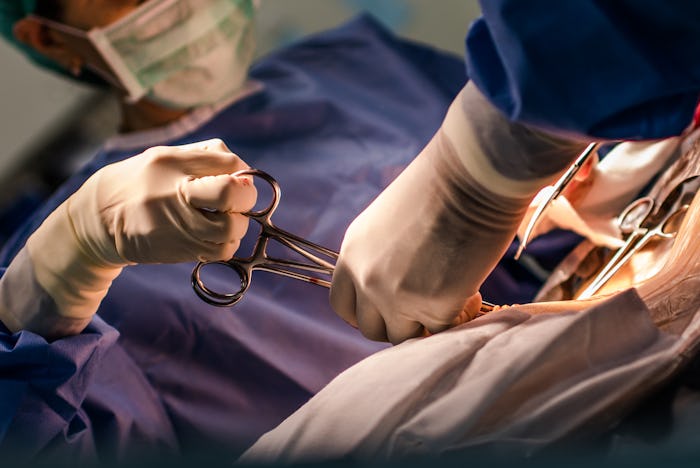Life

Here's What Happens To Your Placenta During A C-Section
I have some bad news for moms-to-be: your baby isn't the only thing to come out of you when you give birth. Everything from poop to afterbirth winds up on the delivery table. When you deliver your baby vaginally, things like the placenta and fetal membranes just slip out, for lack of a better term. But what if you're not delivering vaginally? Does the placenta still come out vaginally after a C-section, or is there another way to remove the afterbirth from your system?
According to the Mayo Clinic, the placenta is an organ that your body literally creates during pregnancy. Its purpose is to provide your growing baby with nutrients and oxygen, and remove waste. It is attached to your uterus and your baby's umbilical cord stems from it, providing a way for nutrients to flow freely.
As amazing as placenta is during pregnancy, it's no longer necessary once you give birth. So, it must come. For vaginal deliveries, the placenta is "delivered" in the afterbirth once your baby is born, usually through a few post-labor contractions to help get it all out. According to Parents, the "afterbirth" consists of the placenta and blood, and it's usually delivered fully intact without complication.
For C-sections, however, the placenta isn't delivered vaginally. Not surprisingly, the placenta is taken out in the same way your baby is — through the incision. What To Expect noted that once your baby is delivered, the doctor will cut their umbilical cord and then remove the placenta and do a routine check of your reproductive organs before stitching you back up.
What To Expect also noted that, since a C-section increases the risk of placental issues like placenta previa and a retained placenta, your doctor will be extra cautious when removing it.
Even though you'll be preoccupied with your new baby, your doctor still has work to do after delivering your baby to ensure that your placenta is intact and safely removed from your uterus. But of course, at that point, the placenta will be the last thing on your mind.